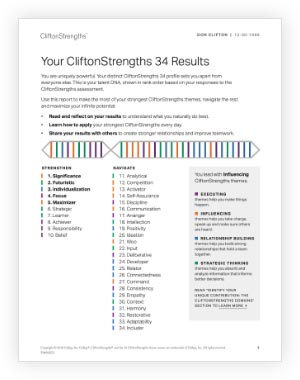Story Highlights
- Meaningful employee recognition needs to be frequent and individualized
- CliftonStrengths allows managers to see employees’ unique contributions
- Strengths-based recognition creates belonging and sustained results
According to Gallup’s employee engagement research, one of the hardest statements for an employee to strongly agree with is, “In the past seven days, I have received praise or recognition for doing good work.”
In the business world, employee recognition often boils down to awards ceremonies, plaques and gift cards. Rewards and recognition like these, though well-intended, are at best insufficient and at worst counterproductive.
Take, for example, a successful and driven sales manager who once looked at me with dismay in the middle of a two-day manager course when he realized that his team’s engagement data showed that they felt severely underrecognized. He told me, “Every month when we hit our sales goals, I order pizza and open up the soda machines. For every birthday, I buy a cake for everyone to share.” Of the many ways to recognize employees, his weren’t working.
His pizza and birthday cakes, though well-intended, lacked the key ingredients of meaningful employee recognition: It needs to be frequent and individualized.
How to Recognize Employees in a Meaningful Way
Make It Frequent
Recognition literally means “to think about [cognition] again [re-]”: re-cognition. The team I am privileged to manage travels the globe teaching development courses to coaches and leaders. Many of these talented professionals have told me unprompted, “You know what means the world to me? Every week, you send me a short note about where I am, and you ask me how I’m doing.” Simply put, these notes are recognition because it matters tremendously that I am “thinking about them again.”
Managers do not need to spend money on lavish employee recognition events (although few people complain when this happens). But they do need to spend time every week thinking about each person on their teams and ask a profoundly simple question:
“What was the most engaging part of your week?”
The answer to that question is a gold mine. It helps managers understand what people do best, care most about and need clarity on. It also provides a platform for genuine, individualized recognition.
Make It Individualized
Employees want to know that their unique impact has been seen and valued. Writing “great job” in an email is not individualized praise. A pizza party is not individualized recognition. Even an Employee of the Month award is not in itself worthy acknowledgement for a job well done.
Managers do not need to spend money on lavish employee recognition events, but they do need to spend time every week thinking about each person on their teams.
Managers who know the CliftonStrengths of their team members can go beyond parties, plaques and patronizing platitudes. They understand each employee’s unique contribution. They know when a person has put in discretionary effort with their Achiever, dazzled a client with their Communication, moved the mission with their Belief or outpaced their own standards with their Maximizer. They know the words and feelings that need to be conveyed in order to speak to the specific patterns of thought, feeling and behavior that most meaningfully resonate with each member of their team.
Why Give Meaningful Employee Recognition
Recognition is valuable because it makes people feel good about themselves. However, the power and business importance of recognition extends well beyond building someone’s self-esteem.
Positive reinforcement indicates for people exactly what you value -- what benefits the team and the organization -- and how they can do more of it. It isolates and encourages repeatable moments that support productive behavior. One of the best ways to show an employee what’s expected of them at work is to recognize them for performing a specific activity.
Recognition and Maslow’s Hierarchy of Needs
“What a man can be, he must be. He must be true to his own nature.” -- Abraham Maslow
Abraham Maslow was one of the founders of positive psychology, as was Don Clifton, the creator of CliftonStrengths. Just as Clifton studied the traits of highly accomplished people, Maslow studied “peak experiences” of individuals who achieved success. Resulting from this research, Maslow developed his Hierarchy of Needs, which depicts what he understood as the essential requirements of individual thriving:
- Physiological needs: air, water, food, shelter, sleep, clothing
- Safety needs: personal security, employment, resources, health, property
- Love and belonging: friendship, intimacy, family, sense of connection
- Esteem: respect, self-esteem, status, recognition, strength, freedom
- Self-actualization: desire to become the most that one can be
While recognition is clearly a fundamental component of esteem, it is also an important component of other needs throughout the hierarchy -- it is necessary for creating psychological safety, belonging and, ultimately, self-actualization.
One of the best ways to show an employee what’s expected of them at work is to recognize them for performing a specific activity.
Psychological Safety
Only four in 10 employees report unethical behavior at work if they have firsthand knowledge of it.
Timothy R. Clarke in his book The 4 Stages Of Psychological Safety describes a conceptual model of four stages of psychological safety that teams can move through:
Meaningful employee recognition plays a crucial role in creating the first stage of safety, inclusion, in which members feel safe to belong to the team. They are comfortable being present, do not feel excluded, and feel like they are wanted and appreciated.
Knowing and valuing every team member’s CliftonStrengths helps them feel understood and appreciated, which makes reaching this stage all the easier. Without the safety of inclusion, it is very difficult for people to experiment, contribute and challenge others.
Belonging
Only two in 10 employees feel connected to their organization’s culture.
Employees need to feel like part of the social life of the workplace. A lack of recognition can make them feel like an outsider, like they don’t belong or like what they do isn’t connected to the success of the team.
A strengths-based team is a group of imperfect but talented contributors who are valued for their strengths and who need one another to realize individual and team excellence. A great team feels a sense of belonging, which is the foundation for achieving meaningful, sustained results.
Esteem
Only 23% of employees strongly agree that they get the right amount of recognition for the work they do.
Recognition for good work also creates beneficial positive emotions that broaden employees’ perspectives and stimulate creative thinking about how they can do more.
Self-Actualization
Simply put, self-actualization includes fulfilling your greatest potential through your talents.
And yet, only one in three employees strongly agree that they have the opportunity to do what they do best every day. Doubling this number would result in significant gains in profitability and a 30% reduction in turnover.1
Doing what you do best begins with knowing your strengths. The right recognition reinforces authentic successes by cementing the memory of what the employee did right and encoding that memory with positive emotions that make it more meaningful.
Strengths and recognition are important building blocks for each person to self-actualize.
Ask first. Then listen. Leadership will follow.
Every week, look at the name of each team member. Re-cognize them (think about them again). Ask them about their week. Listen. When you do that consistently, individualized and genuine employee recognition will follow. When it does, the individuals on your team will genuinely follow you.
Create a culture of meaningful recognition at your organization.
- Identify and recognize your employees’ talents using the CliftonStrengths assessment.
- Discover how to create a strengths-based culture that brings out the best in every employee.
- Learn more about why meaningful conversations are a great manager’s most important habit.
CliftonStrengths® and each of the 34 CliftonStrengths theme names are trademarks of Gallup. Copyright © 2000 Gallup, Inc. All rights reserved.





